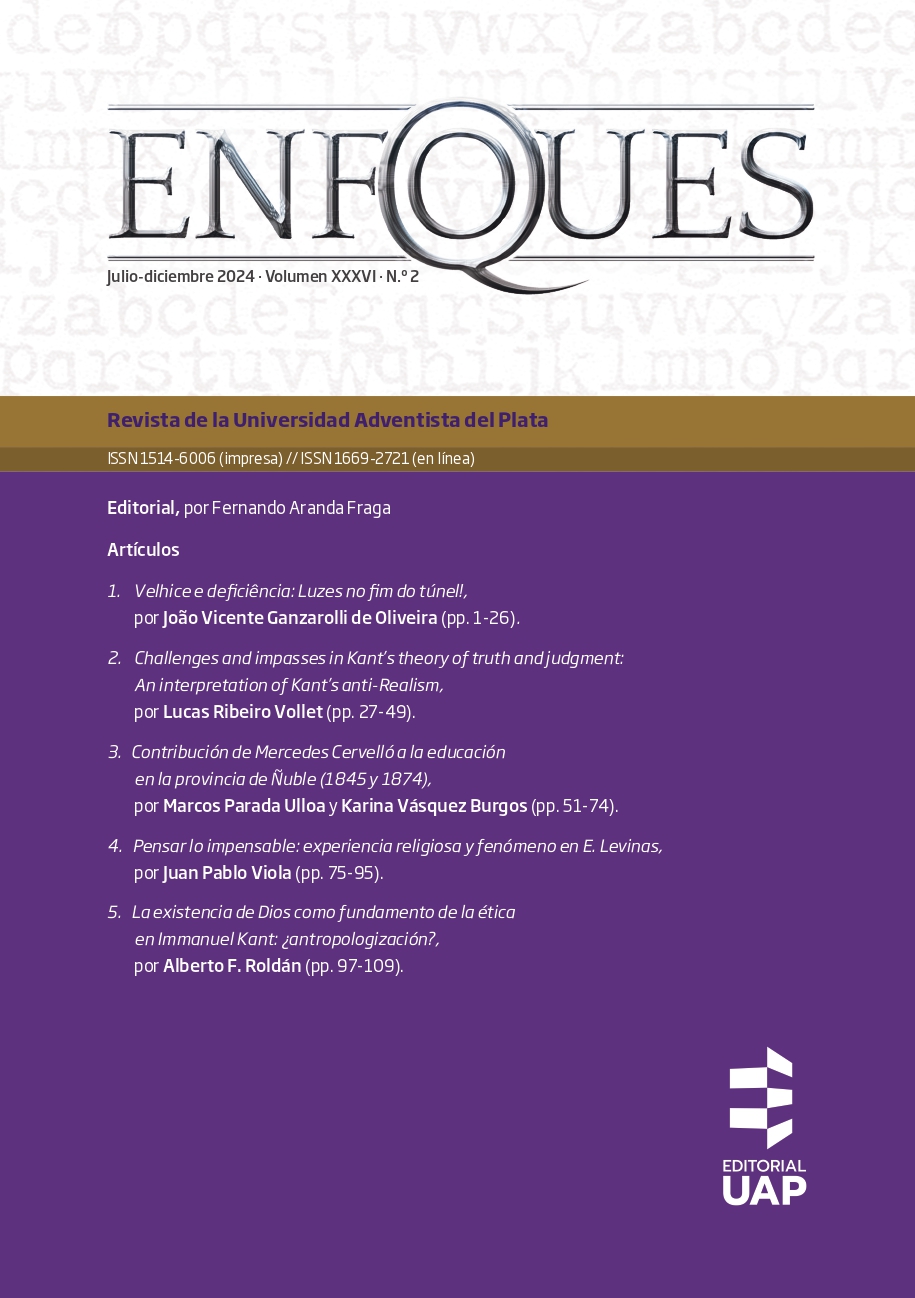Desafios e impasses [dúvidas] na teoria da verdade e a análise de Kant: Uma interpretação do antirrealismo de Kant
DOI:
https://doi.org/10.56487/enfoques.v36i2.1191Palavras-chave:
Idealismo — Anti-realismo — Kant — Apercepção — TranscendentalResumo
Este artigo tem três objetivos. A primeira é mostrar a inevitável ambiguidade entre
realismo e idealismo na obra de Kant. A segunda é mostrar a natureza do realismo
kantiano como a sua resposta ao cético e uma reflexão sobre o caráter objetivo das
representações. A versão da realidade empírica proposta como resposta ao cético,
contudo, tem elementos evidentes de anti-realidade: é construída na tensão entre a
ideia de prova e a ideia de verdade. Kant aplica a teoria da apercepção e do julgamento, que operam gerando parâmetros conceituais puros (categorias) para se ajustar a
essa tensão. A forma como a teoria da apercepção e do julgamento de Kant propõe
soluções para o problema de alinhar verdade e prova é consistente com soluções epistêmicas, anti-realistas, antimetafísicas e não clássicas para a representação lógica (que
é compatível com a lógica transcendental de Kant). Por fim, ofereceremos um retrato
da discussão sobre a natureza do realismo empírico kantiano e compará-lo-emos com
a versão da “realidade” apoiada pela visão metafísica, pela ciência empírica pelo senso
comum.
Downloads
Referências
Immanuel Kant, Critique of pure reason (Cambridge University Press, 1998). Abreviattion for Critique of Pure Reason: KrV Kritik der reinen Vernunft (1781, 1787). Cited by A/B pagination.
Peter Strawson, The bounds of sense: An essay on Kant’s critique of pure reason (London, Methuen & Co. Ltd.; New York, Barnes & Noble, Inc, 1966), 29.
Ibid., 32.
Jonathan Bennett, “Strawson on Kant”, Philosophical Review, 77 (1968): 1.
V. O Willard, “Quine: Two dogmas of Empiricism”, Philosophical Review 60 (1): 20–43 (1951).
Wilfrid Sellars, Empiricism and the philosophy of mind (Cambridge, Mass.: Harvard University Press, 1997).
Henry, Allison, Kant’s transcendental Idealism, rev. exp ed. (New Haven, CT: Yale University Press, 2004).
Karl Ameriks, Kant’s elliptical path (Oxford: Oxford University Press, 2012).
Robert Pipping, Kant’s Theory of form: An essay on the Critique of pure reason (New Haven, CT: Yale University Press, 1982).
Graham Bird, The revolutionary Kant (Chicago and La Salle, Il: Open Court, 2006).
Beatrice Longuenesse, Kant and the capacity to judge (Princeton, NJ: Princeton University Press, 1998).
Paul Abela, Kant’s empirical realism (Oxford: Oxford University Press, 2002).
Allen Wood, Paul Guyer, Henry Allison, “Debating Allison on transcendental Idealism”, Kantian Review, 12 ( July: 2007): 1-39.
Immanuel Kant, Prolegomena to any future metaphysics: With two early reviews of the Critique of pure reason (New York: Oxford University Press, 2003).
Robert Hanna, Kant and the foundations of analytic philosophy (New York: Oxford University Press, 2001).
Kenneth Westphal, Kant’s critical epistemology: Why epistemology must consider judgment first (New York, Routledge. 2020): 2.
KrV A491/B519.
KrV B 142-3.
KrV A 267 / B 322.
KrV A 134 / B 173.
KrV A xvii.
Downloads
Publicado
Edição
Seção
Licença

Este trabalho está licenciado sob uma licença Creative Commons Attribution-NonCommercial-ShareAlike 4.0 International License.





